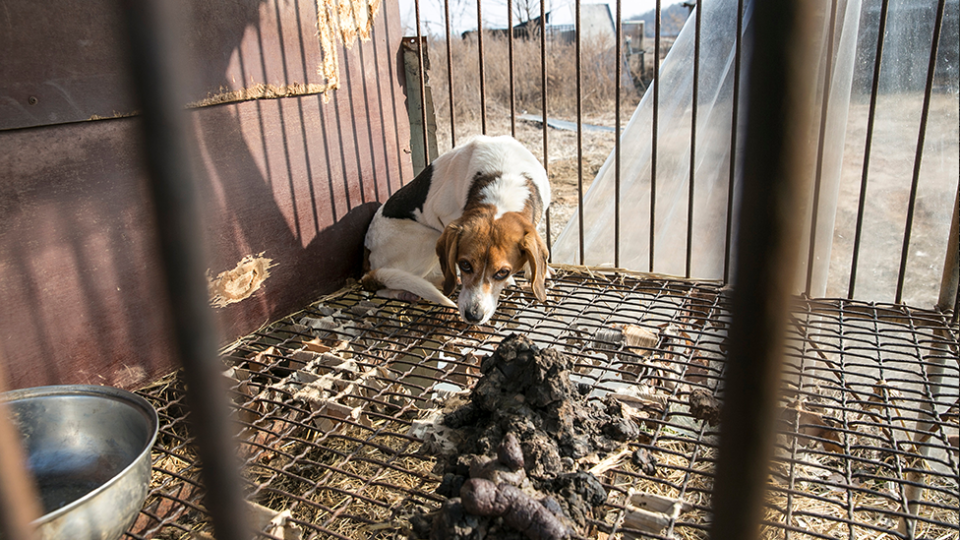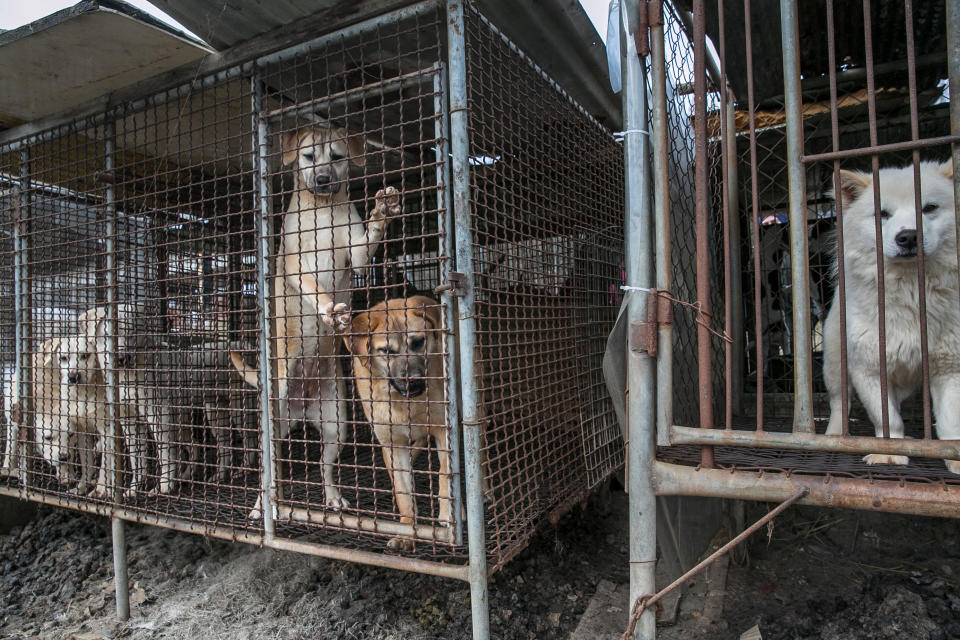'Bit of an unknown': Dog meat farm shutdown stalled by coronavirus restrictions
WARNING – DISTRESSING IMAGES: A plan to evacuate 70 animals from a South Korean dog meat farm has been affected by strict coronavirus travel restrictions.
The “factory farm” in Hongseong, 111km south of Seoul, has operated for 40 years, where, according to not-for-profit Humane Society International (HSI), market forces dictate whether the pups go to loving families or a cooking pot.
Images of the farm provided by HSI appear to show a variety of popular breeds living in small rusted cages, sheltered by tarpaulins.
Piles of dog excrement, which appear to have fallen through holes in the wire flooring, have built up on the ground.
Investigators reported finding a mix of animals including poodles, beagles, huskies, golden retrievers, Pomeranians, chihuahuas and Boston terriers.
HSI have closed down 15 dog farms. By the end of the month, they are determined to make this number 16.

Unlike other South-East Asian countries where dogs are “snatched from the streets”, the South Korean trade is comparatively organised, with farmers operating large breeding facilities which can comprise up to 1,000 animals.
Wendy Higgins, HSI director of international media, spoke to Yahoo News Australia from London, where she has helped coordinate the South Korean dog rescue program which has saved more than 2,000 dogs.
The farm shutdowns, which began in 2015, usually involve large teams, comprising of locals backed by the HSI global rescue team who work with farmers to re-home animals.
Cages and slaughterhouses are dismantled and destroyed, and the farmers are set up with other income streams such as vegetable farming.
‘No future in this dog meat industry’
While common practices like slaughtering dogs in front of other dogs run counter to local animal welfare laws, there is no specific law against trading in dog meat.
“We never ask a dog farmer to close or persuade a dog farmer to close, they come to us, usually via word of mouth from other farmers we’ve worked with,” Ms Higgins said.
“As the appetites and attitudes towards dog meat have changed in South Korea, and we’ve also seen crackdowns in regulations with slaughterhouses and markets closing down.
“Dog farmers are increasingly finding it difficult to make a living and we also find that the dog farmers are under a lot of family pressure to close.”

Investigators who met with the Hongseong dog farmer, Mr Kim, before COVID-19 restrictions were implemented, say he told them running the farm had become financially unviable.
“I don't think there are many people in South Korea who are willing to run dog meat farms anymore,” HSI reported he said.
“There is no future in this dog meat industry.”
‘It’s a bit of an unknown’: 70 dogs go into boarding facility
Closure of Mr Kim’s farm was due to begin in March, but when the coronavirus pandemic hit South Korea, that date was pushed back to mid-May.
Coronavirus measures are easing within the country, but travel restrictions will still prevent the dogs from being flown overseas to be re-homed, meaning the animals will be temporarily housed at a boarding facility.

Dangerous coronavirus myth leads to unexpected dog meat demand
'Streets of horror': Wildlife trade continues despite coronavirus warning
Inside the 'heartbreaking' dog meat farm where up to 5000 animals were slaughtered
“The kennel that we use, we normally just send a few of the more sickly dogs that need to come off the farm immediately,” Ms Higgins said.
“This is the first time that we’ve moved an entire farm’s worth of dogs to a boarding facility.
“In order to do that, we’re having to help the boarding facility to create new shelter infrastructure just to accommodate these dogs.
“It’s a bit of an unknown, but at least we’re at the point now where there’s more free movement in South Korea and we can get them off the farm.”
Once travel restrictions ease, the majority of the dogs will be flown to the US and Canada, and placed with families.
Do you have a story tip? Email: newsroomau@yahoonews.com.
You can also follow us on Facebook, Instagram and Twitter and download the Yahoo News app from the App Store or Google Play.





